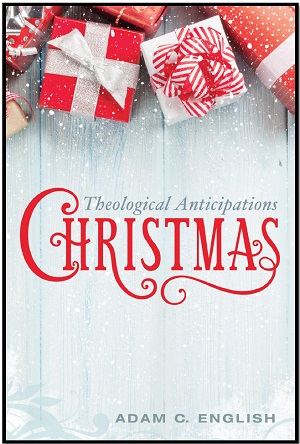Four years after gaining international attention for “The Saint Who Would Be Santa Claus,” Dr. Adam C. English is back with another Christmas-related book: “Christmas: Theological Anticipations.”
Published by Wipf and Stock, “Christmas: Theological Anticipations” explores the historical, theological, and cultural foundations of the holiday and its implications for the Christian life.
English, chair of Campbell University’s Department of Christian Studies, answers questions about his new book below.

Why did you write “Christmas: Theological Anticipations”?
The book is aimed at people looking to encourage their faith over the holiday season. It’s a short book divided into seven major chapters, each one taking a different theme of the season. Each chapter is like a big family meal — with a little something to delight and satisfy everyone.
Each chapter has something serious and something light, an interesting bit of scholarly information and a warm personal anecdote or piece of pop culture. I try to reflect deeply on the meaning of Christmas for Christians, but also try to connect to “Frosty the Snowman” and crass Christmas sweaters.
Christmas is a high and holy season in the Christmas faith. Next to Easter, it is the most important celebration of the year for us.
But Christmas is also a time of family get-together, driving around and looking at lights, singing carols, and watching old TV classics. Christmas brings together so many things at once. And, really, that’s what I’m trying to do in this book. I’m trying to bring all these strange and familiar dishes together and set them on the dinner table to be enjoyed.
What makes this book different from other books on Christmas?
My frustration with books about Christmas is that they are too sentimental and syrupy, or they are too compartmentalized. By “too compartmentalized” I mean many of them cover just one technical aspect of Christmas like the biblical nativity stories or the theology of the incarnation or the historical development of the holiday. I tried to pull all those loose ribbons together into one book.
The book is called “Christmas: Theological Anticipations.” What do you mean by “theological anticipations”?
I want this book to be readable and accessible by any number of people. For this reason, I have called it “theological anticipations.” It anticipates the rich theology of the season without getting lost in the minutiae of debate. It is a collection of reflections on the season that includes stories, anecdotes, observations from theologians, and pastoral insights.
What did you learn while writing the book?
One curiosity that I really wanted to investigate and did investigate for this book: the evidence regarding the year and date of Jesus’ birth. I have always been puzzled by this. You hear so many different plausible dates — scholars say Jesus was born in 6 BC, or 5, or 4, or 1. You hear scholars defend and reject the month of December as a likely time of birth.
And it’s also tantalizing because anyone can read the clues in the Gospel of Luke. But do the clues line up and point to one year and one day? What other information do we have? Until now, I had not examined the matter thoroughly. I present and discuss my findings in one section of the book.
What does Christmas mean to you, and what do you hope readers take away from the book?
Christmas is, above and beyond all else, joyful. We sing “Joy to the World,” but oftentimes our theology of Christmas does not reflect that joy very well. At every turn I find laughter, joy, surprise. Christmas reminds us not to take ourselves too seriously.
G.K. Chesterton observed that “seriousness is not a virtue,” although sometimes we behave as if it was. We don’t get any moral credit for being serious. Remember that the Gospel is most basically “good news,” happy news, glad tiding. Those who receive the good news must do so as little children, and that means giving up some of our adult ways.
An excerpt from “Christmas: Theological Anticipations” | “In the end it is laughter that will save us”
Mary and Joseph had committed no crime nor had they engaged in civil disobedience, but Herod hunted them anyway. The powers that supposedly kept law and order threatened their very safety. Beneath the glittery façade of Herod’s concern for the common welfare of his people lurked an ugly libido dominandi, the desire to dominate and subdue.
 The most expedient way to satiate that desire, as the king of Judah well knew, was brute force, coercion, and violence. In that sense, Herod was no different than any tyrant or bully in history. The fatal flaw in the will to power and the desire to dominate, as illustrated by the Bible’s story, is fear. Fear fuels the desire and the will, but it also consumes what it fuels. Like gasoline, fear proves tremendously unstable and highly combustible.
The most expedient way to satiate that desire, as the king of Judah well knew, was brute force, coercion, and violence. In that sense, Herod was no different than any tyrant or bully in history. The fatal flaw in the will to power and the desire to dominate, as illustrated by the Bible’s story, is fear. Fear fuels the desire and the will, but it also consumes what it fuels. Like gasoline, fear proves tremendously unstable and highly combustible.
Fear drove Herod to hunt the child and to hunt in such an irrational manner that some scholars and skeptics doubt the stories – for what harm could a baby boy possibly do to a full grown man and king? And yet, fear of the child lashed his unbridled mind to action. Within a few short months (or perhaps even weeks), Herod himself would be dead.
The will to power confines the soul to a hamster wheel of sorts, in which the soul must go round and round faster and faster, arriving nowhere. The logic is that to gain power, one must have knowledge and control, but to have knowledge and control, one must have power over one’s enemies and friends, over subordinates and colleagues. Any person that stands outside of this control, even if he be a child, presents not just a potential threat but a real violation, for that person has a modicum of power that has not been relinquished and subsumed. We must realize that the desire for power is never fully satisfied. The more power is claimed, the more it is craved. Fear reigns supreme.
The happily silent and silently happy infant Jesus presents his own alternative to Herod. The alternative of the baby is the way of simplicity, of innocence, of contentment – the alternative of childlikeness. In a world that privileges the bruising competitiveness of adulthood, God presents himself as a baby boy. Of all the ways God could have come for our salvation, the Almighty One came as in the most helpless way. And indeed, we might say that Jesus never quite outgrew his childhood. Even as an adult he said, “Let the little children come to me” (Matt 19:14). Jesus used the example of the child to model the kingdom of heaven and to teach how every person, no matter how big or important, must enter.
The Son of the Almighty who clutched the power to disintegrate and reconstitute the world submitted himself to the free-fall helplessness of infancy. He submitted himself to the total care of others to feed him, wash him, cloth him, and love him. Though he could not speak as a babe in arms, still he taught. The speechless little one remained the ever-spoken Word in the sense that the infancy of Jesus gives us the model of salvation: we must be born again, we must reenter the womb and come out as little children, as helpless babies. We must admit our need — our total and complete need, without reservation, without exception.
The way of Jesus does not offer instant gratification or intellectual prestige or political power. It is a slow way. It is an uncomfortable way. It is an inefficient way and furthermore it won’t work, because, after all, it’s for kids. For this reason it is laughable in the eyes of the world. But you should know that in the end it is laughter that will save us. Upon the stage of the world we strut and stumble and act out our parts, unaware that we are in a divine comedy. Indeed, it is not a comedy because the actors make it so but because the Author wills that it not end in tragedy.

